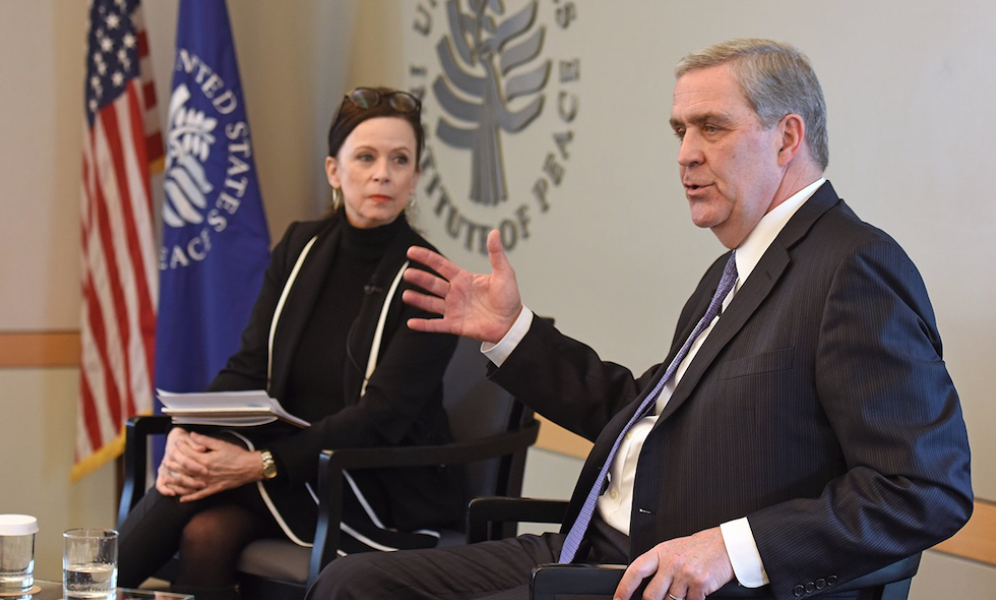On Monday, February 14, the United Institute of Peace hosted Former NATO Ambassador Douglas Lute to discuss the difference between the Cold War and the type of wars that are being conducted today. Previously there was a much higher emphasis on the collective security of NATO members. NATO continuously moved its joint defense forces to the areas that were most needed.
Speakers: Ambassador Douglas Lute (Former NATO Ambassador and White House Official)
Moderator: Robin Wright (join fellow, U.S. Institute of Peace and the Woodrow Wilson International Scholars)
Is NATO obsolete?
Ambassador Douglas Lute states that if somebody calls NATO obsolete, that person has missed 25 years of history. NATO has continuously moved its joint defense forces to the areas in which they were most needed, per say from their standing on the Berlin Wall to the support provided by the US in Afghanistan. The organization expanded and opened its door to many different nations, welcoming them to a democratic alliance. It opened its door to partnerships to 40 other countries. Among the partners, one can count every former Soviet socialist republic as well as Russia itself. That adaptation shows an organization that is paying attention. He does not think that NATO should sit back and let the events roll. He is quite adamant that NATO is up to the task and quickly adapting.
Adaptation
The former Ambassador concludes that the first fundamental change NATO has to overtake, has to do with responding with a newly aggressive Russia, and a host of challenges from the South such as the mass illegal migration, an unstable neighborhood. The world faces different challenges than during the Cold War era. There are Russian provocations seen in the Donbass region, and on the other hand, there are migration and terrorism issues. Because of the preceding exemplified reasons NATO has indeed changed fundamentally. Since 2014, starting with the seizing of Crimea, NATO took the following adaptive steps:
- Increased and build the political consensus in the defense budget.
- NATO has expanded the regions in which they deploy troops to the Eastern flank.
- The organization is now providing counter-terrorism support through a US-led coalition. All NATO members are participating as well as 20 partners.
The idea that NATO is not pursuing as much action as in the past is simply the cause of the lack of broadcasting and is a false accusation. The organization’s efforts today can be compared to those during the fall of the Berlin Wall. Although NATO efforts are not evident today, they will become in a couple of years, concludes the Ambassador Douglas.
Al Qaeda
Ambassador Douglas addresses the idea that NATO should do more than they are doing today. Although the organization currently has a mission in Iraq and is helping the state’s forces, there will be a need to provide further assistance once the conflict is over. There is a need for NATO to assist with the build of long-term infrastructure.
Further, the former Ambassador states that although NATO members deal with terrorist attacks alongside their States forces, on their territory, there is a need to share information. Attacks can be prevented if the defense officers have the necessary information, and they could use the backbone of NATO to pursue this idea. The machinery and the protocols to share information are already in place, but the members need to do a better job at reaching out to each other as well as to the partners.
Ambassador Douglas argues that it is important that NATO stands as a representative of Democratic values. The organization cannot respond to the threat in a way that it is self-deceiving. The alliance cannot move away from their core standards. NATO was founded based upon democracy, so they need to respond to the threat bound by democratic values. ISIS will use the drift from the values as a weapon against NATO. There is a need for information sharing but a more fundamental question such as be true to who we are and what we signed up for. There cannot be adrift on the values.
Information Sharing
Douglas draws upon the protocols for sharing intelligence which tends to feature an exclusionary approach, he concludes. If there is a challenge in a particular country, there will be a proportion of information, but it would be bilateral and in minuscule amounts. Per say regarding the ISIS franchises, the core, and what is left behind once the terrorist organization is pushed out. It is important for the members as well as the partners to establish the next phase together. He strongly argues that there is a need for cooperation and a well-established joint plan to rebuild the devastated regions.
Russia
Ambassador Douglas states that through the illegal seizure of Crimea and the violation of Ukrainian sovereignty, which left behind a destabilized region, Russia did not respect the basis of the UN Charter. It breaks the rule in Western Europe from experience of violating sovereignty and borders.
Synthesis by: Patricia Besciu, all opinions are those of the speaker, no personal ideas included.
For more information visit: https://www.usip.org/events/wars-today-and-tomorrow
